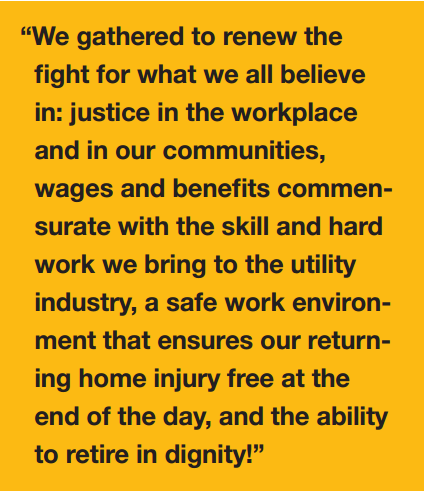
Every four years, local unions from around the country meet to chart a course for the future with the shared mission of improving the lives of utility workers. We came together this year more determined than ever to confront the attack on working people by radical right-wing politicians and their corporate sponsors. We gathered to renew the fight for what we all believe in: justice in the workplace and in our communities, wages and benefits commensurate with the skill and hard work we bring to the utility industry, a safe work environment that ensures our returning home injury-free at the end of the day, and the ability to retire in dignity! These are the values we hold dear as trade unionists and they were expressed in the resolutions delegates passed on behalf of the membership. The convention theme, and the main focus of the UWUA for the next four years, is centered on five powerful words: RECLAIM, RETRAIN, REPOWER, REPAIR AMERICA. With this theme, our goal is to restore democracy, rebuild America, and grow the shrinking middle class. The following are brief descriptions of convention resolutions addressing this theme:
 RECLAIM (R-6 Reclaim America – Political Action And Cope)
RECLAIM (R-6 Reclaim America – Political Action And Cope)
We need to reclaim our democracy. As the war on workers continues, it is imperative to elect pro-labor candidates. The Supreme Court’s “Citizens United” decision released in January of 2010 opened the floodgates to political contributions by declaring that corporations are people and their contributions to political PAC’s are simply an exercising of their free speech rights. Although we will never match corporate contributions dollar for dollar, contributions to the UWUA COPE fund will help friends of labor serving in public office.
RETRAIN (R-9 Retrain America)
Following deregulation, utilities stopped training workers sufficiently. This, combined with 38% of electric and gas utility workers expected to retire in he next decade, and young adult unemployment the highest in generations, is why the UWUA created the Power for America Training Trust Fund (P4A) to train the next generation of utility workers. Additionally, the union established the Utility Workers Military Assistance Program (UMAP) to train vets for energy jobs. And, the majority of trainers are retired utility workers, who know the value of belonging to a union.
REPOWER (R-22 Repower America – Grid Reliability And A Secure And Just Transition)
The UWUA supports a U.S. energy policy that embraces an “all of the above” power generation strategy that does not pick winners and losers. But, there are times when federal and state legislation and regulations fail to include provisions for ensuring that workers and their communities are not left behind in the new “green” economy. The UWUA will continue to speak out on behalf of workers affected by new regulations and utilities manipulating the market at the expense of workers. Supporting clean coal technology (R-20 CLEAN COAL AND GOOD JOBS) such as Carbon Capture and Sequestration (CCS) is key in keeping coal a vital part of our energy mix in the face of the EPA’s Clean Power Plan (CPP).
REPAIR (R-1 Repair America – Infrastructure Investment)
The current condition of our gas, water, and electric infrastructure threatens the U.S. economy and the safety of U.S. citizens. Modernization of the grid has been made all the more urgent by our increasing dependence on a reliable supply of electricity. Because water infrastructure is typically out of sight, it is a chronic source of under investment. As a result, the EPA estimates that one-sixth of the water we treat for drinking and pump into our systems leaks out. The UWUA has successfully advocated for infrastructure improvements through the legislative and the regulatory processes at the local, state and national levels. In Michigan, California, and Illinois, in particular, UWUA affiliates and their communities are benefiting from infrastructure investment. The UWUA urges Congress to support investment in electrical, gas and water infrastructure reliability, resilience and affordability through the development of tools, methods, and new funding for operating the grid and water systems of the future. These are just four of 24 resolutions passed at the convention. There is certainly much work to do. As one Delegate to the convention put it: “When I arrived at the convention I felt a bit weary, but after being here for a few days, I feel energized and determined to go back to my local and fight for the issues that are important to us all.”

